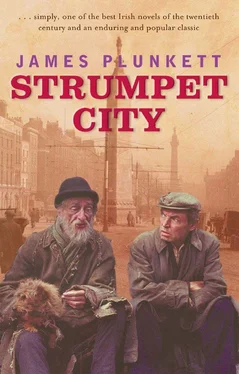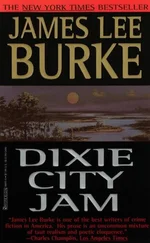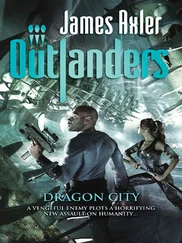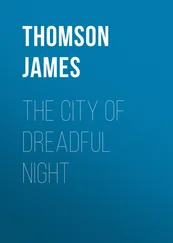‘You’d better call out help. We’ll need carters and more men to dig.’
Fitz found the list in the time office, where the timekeeper, half asleep over the fire, jumped up in alarm at his entrance.
‘Blast you anyway,’ he said. ‘I thought for a minute you were Carrington.’
‘I’ve come for the emergency list,’ Fitz said, ‘the main coal-stack is on fire.’
The timekeeper produced it from a drawer.
‘We use the carters from Doggett & Co.,’ he said. ‘Barney Mulhall is the man to see first.’
‘Have you his address?’
‘Chandlers Court,’ the timekeeper said, his eyes searching down the list. ‘Here you are—number three.’
Fitz took his bicycle and headed out into the streets. He was the only traveller. The city was dead and dark and windswept. In addition to the carters there would be labourers needed. He decided to call on Pat Bannister, with whom he had been sharing a room since Mary had gone to the Farrells. Pat was out of work because for the moment the storage yard of Nolan & Keyes was packed to capacity. He decided to call on Farrell too: he was still being ignored by the stevedores. There was at least a night’s work in it for each of them. The double line of tram-tracks gleamed wetly as he turned across them into Chandlers Court and found number three with difficulty. The hall door was closed over, but there was no lock and he pushed it in with his shoulder. A dog barked from the basement as he entered the hall. He climbed two flights. It was impossible not to make a noise on the bare boards and to stumble now and then on the uneven stairs. The walls in the dim light of the oil lamp he had taken from his bicycle were greasy and peeling. The smell of communal living lay heavily and unpleasantly on the landing. He knocked at the door of the two pair back and noticed that the paint was cracking and blistered as though there had been a fire.
After a while there were movements and a deep voice asked: ‘Who is it?’
‘Emergency call,’ Fitz answered, ‘Morgan’s Foundry.’
‘Hold your horses,’ the voice acknowledged.
Fitz waited patiently. Somewhere above a baby had begun to cry. It was remote yet it transformed everything. There was more here than darkness, than decay, than evil smells. Behind each of these peeling doors, from the ground to the top, there was a home. A man who was naked except for a pair of trousers which he held in position with one hand, opened the door and said: ‘Step in.’
Fitz hesitated.
‘Do as you’re told,’ the man insisted. He was obviously used to laying down the law. Fitz noticed his bulk and height. But there was a pleasant note in his voice. He was not a bully.
Mulhall made way for him and he entered the room. The atmosphere was close, but snugly so. The only illumination was the red glow of a lamp which stood on the mantelpiece before a statue of the Sacred Heart. A yellow circle of light wavered on the ceiling above it. As Mulhall pulled on his shirt there were movements in the far corner. A match gleamed and a gas ring threw a blue light. Mulhall, having pulled his braces over his huge shoulders, lit a candle and said:
‘What the hell are you at now?’
‘Keep your voice quiet,’ the woman whispered. She was elderly. Fitz knew by the voice and by her stooping movements in the combined light of candle and gas ring.
‘That’s herself,’ Mulhall said to Fitz, pulling on his socks.
The woman said: ‘You’ll waken the child.’
Mulhall chuckled deeply and said to Fitz: ‘The child is in the bed beyond there. He’s fifteen and nearly as big as I am.’
Fitz guessed at, rather than saw, a single bed in the far corner.
‘What’s your name?’ Mulhall asked.
‘Fitzpatrick,’ Fitz said.
There were sounds near the gas ring; the thump of a kettle, the rattle of cups.
‘She’s making tea,’ Mulhall confided. He was having trouble with one of his boots.
‘It won’t take a minute,’ the woman said, ‘and you’ll be glad you had it when you face the street outside,’ Then she said: ‘You might ask the young man to take the weight off his legs.’
Fitz could see them better now. Mulhall had thick grey hair above a heavy forehead. The woman, a coat thrown about her shoulders, had once been tall. Her movements were gentle. In the candlelight her shadow bobbed from wall to wall as she put cups on the table and cut bread.
‘Sit over,’ she said.
‘Dear God,’ Mulhall protested, ‘a bloody coal-stack on fire—and she makes tea.’
‘Take it in your hand and swallow it.’ She listened to the wind for a moment and added: ‘It’s a terrible night.’
The second bed was in the angle between a small window and the far wall. Fitz could see it better now. There were movements from it and a boy sat up, blinking. He had a handsome face with dark hair tumbled about the forehead.
‘What’s wrong?’ he asked.
‘Emergency call,’ Mulhall answered.
‘I knew you’d wake him,’ the woman said. She turned to Fitz and explained: ‘The child is in the parcels department in the Tramway. He has a six o’clock start.’
The tea was sweet and hot—too hot. Mulhall emptied his into a saucer and drank it that way.
‘Do you need extra help?’
‘We could do with some,’ Fitz said.
‘Glory be to God,’ his wife said, ‘you’re surely not thinking of the child?’
Mulhall said to her, ‘Will you let me talk, woman.’ He glared at her for a moment over his shoulder. Then he spoke to Fitz.
‘There’s a poor divil upstairs with a wife and a couple of children. He could do with a night’s work.’
‘Is it Mr. Hennessy?’ his wife asked. Again Fitz noted that she was a quiet-spoken woman.
‘The Toucher Hennessy,’ Mulhall confirmed.
‘Then they’ve four children,’ his wife corrected.
‘Holy God,’ Mulhall said, ‘that woman is like a rabbit.’
‘I’ll go up and get him,’ Fitz agreed.
They left down their cups and while Mulhall set off to alert the carters Fitz climbed the remaining stairs. He was now in the attic, on a narrow landing where the ceiling was so low that he stooped. The baby was crying again when he knocked. A woman’s voice responded.
‘Who is it?’
‘We have a night’s work in the foundry, if Mr. Hennessy will take it,’ Fitz shouted.
There was a long interval. He heard whispering inside. Then the woman shouted: ‘He wants to know what kind of work it is.’
Fitz explained and there was another interlude. Then the door opened and a small skinny man looked up into his face.
‘I hope you’ll pardon the preliminary enquiry,’ he said with great politeness, ‘but what class of work is involved?’
‘Digging coal,’ Fitz said.
‘Aw God, wouldn’t that vex you now. I’ve no shovel.’ Fitz thought there was a note of relief in the voice.
‘They’ll give you a shovel,’ the woman shouted, ‘won’t youse, mister?’
‘That’s right,’ Fitz said, ‘we can supply a shovel.’
The man considered this. Then he asked cautiously:
‘Is there any climbing?’
‘What has that to do with it?’ Fitz asked.
‘I’ve no head for heights,’ Hennessy said.
‘Don’t listen to a bloody word he says, mister,’ the woman screamed, ‘he’s only acting the old soldier.’
‘There’s no climbing,’ Fitz said.
With obvious lack of enthusiasm for the prospect of facing the raw and laborious night, Hennessy turned up the collar of his coat and cast a despairing glance back at the room.
‘All right—I’ll go,’ he said.
He followed Fitz on to the street and set off in the direction of the foundry. His figure was huddled against the cold, his pace reluctant. Fitz went to his own place to rouse Pat Bannister and then to Farrell’s. He waited in the kitchen while Farrell dressed, all the time conscious that behind the door to the left of the fireplace Mary lay sleeping. He was torn between his desire to speak to her and his reluctance to disturb her. Before he could make up his mind Farrell had joined him and they went down to the foundry together.
Читать дальше












